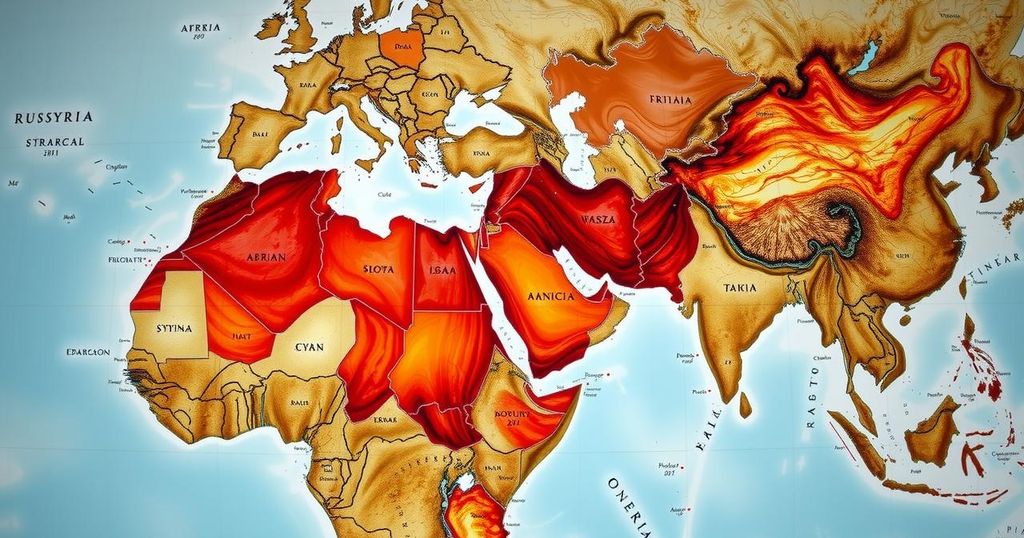Russia’s Diminishing Influence in Syria: Seeking New Military Bases in Africa

Russia is facing a strategic setback as potential loss of its naval base in Syria threatens its operations in Africa. With Syrian rebels gaining power, Moscow may turn to war-torn Sudan or divided Libya for new military footholds. However, establishing viable bases in these countries presents numerous challenges amidst ongoing conflicts and political complexities.
The decline of Bashar al-Assad in Syria represents a significant setback for Russia’s ambitions, particularly for President Vladimir Putin, who has relied on the regime as a strategic ally. As Syrian rebel forces consolidate their power following over a decade of civil war, Russia may soon relinquish its key military establishments in the region, namely a naval base and airfield critical for operations in Africa. The loss of these facilities not only undermines Russian influence in the Middle East but also jeopardizes its ability to project power into the Mediterranean and the Red Sea, where it aims to challenge NATO’s influence.
Historically, Russian military installations in Syria—including the Tartus naval base—have served as vital instruments for reasserting Russian dominance in international waters, echoing its past geopolitical strategies during the Cold War. The Institute for the Study of War warns that the potential fall of Assad could decisively hinder Russia’s strategic objectives for Africa and surrounding regions. The Tartus base, functioning as Russia’s sole overseas naval asset, has facilitated its military operations, particularly before the escalation of tensions following the invasion of Ukraine in 2022.
Since deploying forces to Syria in 2015 and supporting regimes amidst the turmoil of the Arab Spring, Russia has cast a wide net across Africa through tactics that include engaging the Wagner Group—a private military contractor with interests tied to resource allocation in unstable countries. The current geopolitical landscape compels Russia to contemplate alternatives for its military positioning, particularly in Sudan and Libya, both of which present varied challenges but also opportunities.
In Sudan, plans have emerged for a prospective Russian naval base at Port Sudan, following earlier agreements that were stalled by political upheaval. The conflict between the Sudanese armed forces and rival factions creates a complex environment for Russia, who appears to strategically align with both sides as it hopes to secure vital mining rights and military footholds in the region. Recent activities suggest that the Wagner Group has reaped significant financial benefits from mineral extraction, particularly gold, amidst ongoing conflicts.
Meanwhile, Libya remains another focal point where Russian interests can thrive. The situation, characterized by a fractured governance structure, has allowed Moscow to leverage its relationships and influence, particularly through support of opposition forces against the UN-recognized government. Current plans by the Africa Corps (successor to the Wagner Group) include establishing logistical support and mining operations, thereby consolidating Russia’s foothold in North Africa and safeguarding energy and mineral interests.
However, the prospect of establishing functional military bases in either Sudan or Libya as replacements for Tartus may be constrained by a lack of formal agreements and potential political backlash. While the Kremlin seeks to ensure strategic advantages, the transition from Syrian bases to alternate facilities in Africa is fraught with uncertainty and poses considerable diplomatic challenges.
The historical context surrounding Russia’s military presence in the Middle East and Africa under Vladimir Putin facilitates a clearer understanding of current strategic maneuvers. Since the onset of the Syrian civil war in 2011, Russia has positioned itself as a major player in the region, primarily supporting the Assad regime to reassert its global influence and expand its military assets. This follows a pattern of engagement that sought to counter NATO positions, particularly in the Mediterranean, exemplified by the establishment of military bases. Amid fluctuating geopolitics and the international sanctions imposed after Russia’s aggressive actions in Ukraine, Moscow has increasingly sought new avenues to maintain its interests, particularly through the Wagner Group and its activities across African nations. Amid the dire consequences resulting from the civil war developments and a potential shift in allegiance within conflicted states like Sudan and Libya, Russia’s military strategy must now adapt to new realities—a situation marked by instability and competition for resources.
In conclusion, the evolving dynamics resulting from the Syrian conflict are prompting Russia to reconsider its military and strategic positioning in Africa. The potential loss of military bases in Syria may compel Moscow to pivot towards war-torn Sudan or politically fragmented Libya in a bid to maintain its global presence and pursue economic interests. However, the challenges posed by inadequate formal agreements, significant political backlash, and complex conflicts in these regions may hinder Russia’s ability to swiftly establish suitable alternatives. Ultimately, the situation remains uncertain but underscores the fluid nature of Russia’s international military strategy.
Original Source: www.intellinews.com








